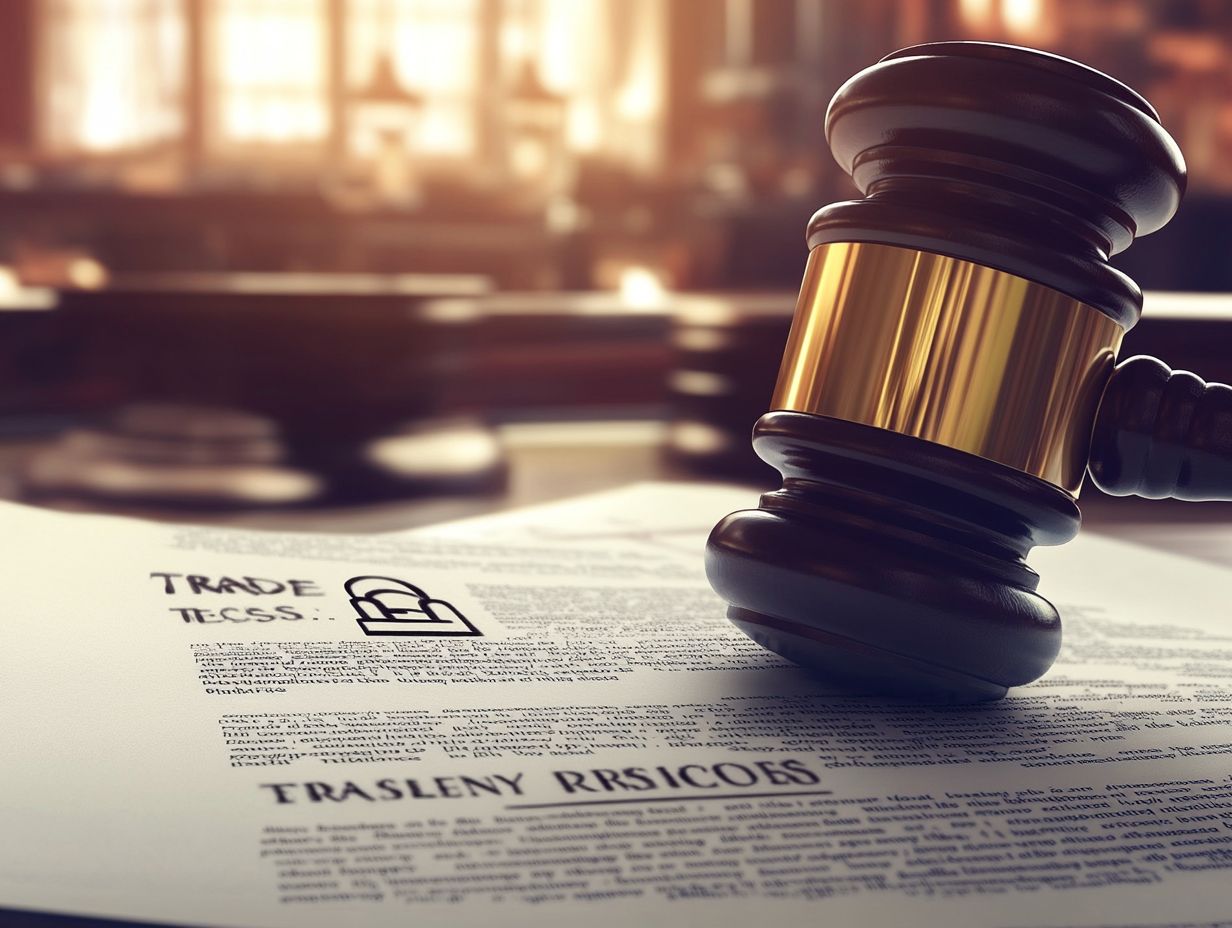Legal Remedies for Trade Secret Theft
Trade secrets are the lifeblood of your business, holding critical information that grants you a competitive edge. Yet, in today s fast-paced market, the threat of theft is ever-present.
This exploration delves into the complex area of trade secret theft, defining what constitutes a trade secret and the various forms this theft can take. It also outlines the legal protections available, the civil remedies and criminal penalties awaiting those who infringe on these secrets, and the important steps to take if you find yourself a victim.
Discover how to effectively safeguard your invaluable intellectual property and navigate the legal landscape with confidence.
Contents
- Key Takeaways:
- Understanding Trade Secret Theft
- Legal Protections for Trade Secrets
- Civil Remedies for Trade Secret Theft
- Criminal Penalties for Trade Secret Theft
- Steps to Take if Your Trade Secret is Stolen
- Frequently Asked Questions
- What is considered trade secret theft?
- What are some common forms of trade secret theft?
- What are the legal remedies for trade secret theft?
- Can a company sue for damages in a trade secret theft case?
- Can employees be held liable for trade secret theft?
- What is the statute of limitations for filing a lawsuit for trade secret theft?
Key Takeaways:

Trade secrets are valuable and confidential information that give companies a competitive edge.
Legal protections for trade secrets include contracts, non-disclosure agreements, and trade secret laws.
If your trade secret is stolen, you can seek civil remedies such as injunctions and damages. Additionally, it is important to understand trade secret litigation options, as you may also pursue criminal charges against the thief.
Understanding Trade Secret Theft
Understanding trade secret theft is essential for businesses that depend on proprietary information to maintain a competitive edge in today s rapidly changing market landscape.
Trade secrets whether they re formulas, practices, processes, designs, instruments, or patterns are vital components of your company’s business model and strategy.
When these invaluable assets are stolen, it opens the door to economic espionage and raises concerns about misappropriation claims and the safeguarding of intellectual property rights.
In an era where information technology drives innovation, protecting your trade secrets is vital for your business success and minimizing the risk of legal disputes.
Defining Trade Secrets and Theft
Trade secrets are any information that grants you a competitive edge insights that aren t widely known or easily discovered by others, and that you take reasonable steps to keep confidential.
This confidential information can include a diverse range of elements, such as formulas, practices, processes, designs, instruments, or patterns that drive operational success.
Think about it: the secret recipe for a beloved beverage or the distinctive algorithms that power a cutting-edge software platform are prime examples of classic trade secrets.
For information to qualify as a trade secret, it must be actively safeguarded and provide economic value, allowing you to maintain an advantage over your competitors.
However, be aware that trade secret theft can take many forms, including unauthorized access to protected data, industrial espionage, or breaches of confidentiality agreements. All of these can pose significant risks to your company s viability and strategic direction.
Legal Protections for Trade Secrets
Legal protections for trade secrets are crucial for safeguarding proprietary information from unauthorized use and disclosure. There are numerous statutes, such as the Economic Espionage Act and the Defend Trade Secrets Act, offering robust frameworks for enforcement.
These laws offer effective remedies against misappropriation. Your valuable information remains secure.
Types of Legal Protections

The array of legal protections available for trade secrets includes confidentiality agreements, injunction requests, and various civil court remedies. These measures are designed to help you safeguard your proprietary information against theft and misappropriation.
These protections are essential in the corporate landscape, allowing you to establish clear boundaries concerning your sensitive data. By implementing confidentiality agreements, you create a legal obligation for employees and partners while signaling the importance of protecting your intellectual property.
Seeking injunctions can serve as a potent deterrent against potential infringers, enabling you to act swiftly when faced with unauthorized disclosures.
However, defending your trade secrets in civil court can lead to substantial litigation costs. Thus, it s essential for you to demonstrate that you’ve made reasonable efforts to maintain the confidentiality of your trade secrets, as this directly influences your case and overall legal standing.
Take action now to safeguard your trade secrets!
Civil Remedies for Trade Secret Theft
Civil remedies for trade secret theft offer a variety of legal options, including those outlined in understanding trade secret infringement, that can result in damages awarded to you as the aggrieved party.
These remedies include monetary compensation and the recovery of court costs and attorneys’ fees incurred while pursuing your claims.
Injunctions and Damages
Injunctions are legal orders that can effectively halt the ongoing use or disclosure of trade secrets. Damages awarded can be tailored to reflect the exact losses you ve suffered due to trade secret theft.
These remedies are vital in preserving the integrity of your confidential business data. When you suspect that your trade secrets have been compromised, seeking an injunction should be a priority.
This legal process requires you to present compelling evidence of imminent harm. Courts will evaluate your request, weighing factors like the likelihood of irreparable injury and the balance of hardships involved.
Alongside injunctions, accurately calculating specific damages like lost profits, unjust enrichment, or royalty payments is crucial. Quantifying these losses not only compensates for the violation but also serves as a powerful deterrent against future misconduct.
Protecting your proprietary information is imperative!
Criminal Penalties for Trade Secret Theft
Criminal penalties for trade secret theft can be severe. Violations of the Economic Espionage Act are classified as federal crimes, potentially leading to substantial fines and imprisonment.
Potential Criminal Charges and Punishments

Potential criminal charges can include stealing trade secrets and other felonies. Penalties can vary based on the specifics of the offense and the corporate entities involved.
The ramifications of these charges can affect not only you but also the companies you represent. Several factors influence penalties, including the extent of the information stolen and your intent behind the act.
Federal courts are crucial in prosecuting these offenses, highlighting the necessity for robust theft protection measures. This complex landscape urges you to evaluate your compliance strategies carefully.
Steps to Take if Your Trade Secret is Stolen
If your trade secret has been compromised, you must act swiftly and strategically!
Start by reporting the theft to the appropriate authorities and ensuring the incident is officially documented.
Next, conduct a thorough access review to pinpoint any potential breaches. Finally, you must file claims for legal action against those responsible for the misappropriation.
These steps can help safeguard your interests and restore your competitive edge!
Reporting the Theft and Seeking Legal Action
Reporting the theft of trade secrets is essential in pursuing legal action. It helps establish a timeline of the incident and lays the groundwork for claims that can protect your business’s competitive edge.
By promptly notifying authorities or legal representatives, you can gather vital evidence documents and witness testimonies that will prove invaluable in court. Taking swift action signals the seriousness of the situation and may deter further misconduct.
The process begins with a thorough investigation to confirm the theft, followed by filing legal complaints. Remember, attorneys’ fees can vary widely depending on the complexity of your case.
Addressing misappropriation claims often requires a nuanced understanding of intellectual property laws. Understanding the potential financial implications and the advantages of timely reporting will enable you to make well-informed decisions for your business.
Frequently Asked Questions
What is considered trade secret theft?

Trade secret theft is the illegal taking, sharing, or using of a company’s confidential information. This is done for personal or competitive gain.
What are some common forms of trade secret theft?
Common types include employee theft, corporate spying, cyber theft, and wrongful use by outside parties.
What are the legal remedies for trade secret theft?
Legal actions against trade secret theft include civil lawsuits and criminal charges. Understanding the legal framework for trade secrets can help companies stop theft by using confidentiality and non-disclosure agreements.
Can a company sue for damages in a trade secret theft case?
Yes, a company can sue for damages. They may claim lost profits, loss of competitive edge, and attorney fees.
Can employees be held liable for trade secret theft?
Yes, employees can face consequences if they illegally disclose or use confidential information for their benefit or to help competitors.
What is the statute of limitations for filing a lawsuit for trade secret theft?
This time frame varies by state, typically between 2 to 6 years. Always consult a lawyer to understand your deadline.






